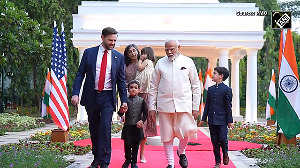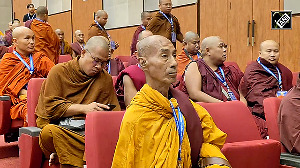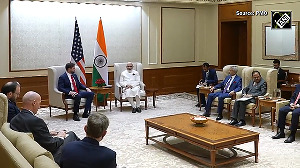Here are two stories from Himachal Pradesh's Hamirpur district that wouldn't probably qualify as election reports. That is the greatest travesty of this election...
_____________________________
Mansaram, a marginal farmer, looked tired and worn down when he entered Dr Kanti Vajpayee's consulting room. The doctor had returned from a long leave only that morning.
He was surprised to learn that in his absence Mansaram had been visiting the clinic every day.
When asked why he didn't consult some other doctor if it was so important to do so, Mansaram quietly slipped some papers into Dr Vajpayee's hands. It was an HIV test report.
It said that Mansaram's son had been tested positive.
Dr Vajpayee asked Mansaram to bring the boy to the clinic. He would like to speak to him, he added.
Mansaram said that would not be possible. His son was getting married the next day.
The doctor asked the old man if he knew what an HIV +ve status meant. Mansaram answered in the affirmative adding that he would spend any amount to get his son treated.
There was very little in terms of treatment that could be done, the doctor told Mansaram and pleaded with him to postpone the marriage.
That was impossible, Mansaram insisted.
How would he explain the postponement to his family, his relatives, his village?
And how long could he go on deferring the marriage? People would ask questions.
Dr Vajpayee asked if he knew his son could transfer the deadly virus to his would-be wife?
Mansaram nodded his head in a 'yes', upped and left the room. That was the last of Mansaram that Dr Vajpayee saw...
_____________________________
Janaki, an 18-year-old widow, came to see Dr Vajpayee on a cold winter afternoon at his residence, accompanied by her mother and a boy she wanted to marry.
Her husband had died of AIDS just six months after their marriage. She wanted to know if she was carrying the virus that killed him.
Strangely, she insisted she never had any sexual contact with her husband.
Dr Vajpayee advised the girl not to rush into anything. He offered to refer her to the Indira Gandhi Medical College hospital in Shimla for periodic tests to establish that she was free of the HIV virus.
It could take time, he informed the trio.
The doctor advised her to wait for a couple of years before remarrying.
The three thanked Dr Vajpayee profusely and left. That was the last he saw of the girl, her mother and the boy she wanted to marry...
_____________________________
As Himachal Pradesh prepares to elect a new government on February 26, no political party is talking about the AIDS tinderbox that the state is sitting on.
While official figures put the number of HIV +ve cases in the state since 1992 -- when the first case was unearthed -- at 500, experts believe the number is much, much higher.
"For every case detected, there are several hundred that go unreported," said an AIDS worker requesting anonymity.
Not many connected with the AIDS programme in Himachal Pradesh are willing to go on record. Most of them do not have any definitive figures.
All official' records are confidential and maintained only at the IGMC, Shimla.
While Hamirpur district has reported the highest number of HIV +ve cases -- 108 -- in Himachal, Dr Vajpayee insists these figures are misleading.
"The first case in the state was detected in Seongta village in Hamirpur district. Ever since the focus has been on Hamirpur. Tests were carried out in several villages in the district leading to unearthing of more cases. Other districts remained smug in the belief that it was not their problem. Now, they have woken up to reality," he said.
"It may be true that because of fewer employment opportunities in Hamirpur, more people from this district migrating to Mumbai and Delhi in search of work.
"These people stay away from their families for long periods, often working as truck and taxi drivers, which qualifies them as a high-risk group."
"But this is no longer specific to Hamirpur. People from all parts of the state are migrating to the plains in search of employment," he said.
"Records say Lahaul Spiti has not reported a single case of HIV. I do not buy this argument. The main reason no cases are reported is because people there have their own traditional methods of treatment," Dr Vajpayee said.
Other districts doing just as badly as yours may be some consolation, but it does not help solve the problem. What could have helped -- Chief Minister Prem Kumar Dhumal's personal interest -- is missing.
Hamirpur is Dhumal's home district, but his Bharatiya Janata Party's campaign does not even mention AIDS.
The campaigning in the state is more about a sex scandal in distant Gujarat allegedly involving some Punjab ministers, which have nothing to do with the problems facing the state and its people.
"This is politics and I am not qualified to talk politics. But it is clear that the political leadership in the state has not understood the gravity of the problem, said a doctor in Shimla.
"I am not sure if even people like you and me -- educated people -- realised how serious this problem is? Did you get an HIV test done before you got married? I did not."
There are other problems too. Considering the sensitivity of the cases, doctors are not allowed to track the behaviour of a carrier. They are not even allowed to inform the carrier about his/her own HIV status till he or she so desires and puts it in writing.
Things are improving though. The state government is now setting up voluntary counseling and testing centres (VCTCs) all across the state. There is also a proposal to establish a tele-counseling network to cover every part of the state.
However, these efforts have had limited impact.
A doctor in Shimla said: "VCTCs are not doing much work and the tele-counseling numbers have become a favourite of pranksters."







 © 2025
© 2025